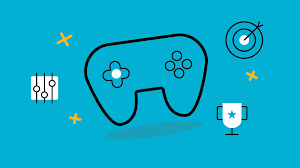Gamification is to use game elements in a non-game context to increase engagement between human and computer, on the other hand, to encourage in-demand for good behaviors in learning (Firas et al. 2019). Andrew and Carman (2013) states that gamification refers to the application of game dynamics, mechanics and frameworks into non-game settings. Kapp (2012) in Wouter (2015) explained that although games are closely related to fun, gamification is a serious approach to improve the learning experience.
The main purpose of gamification is to increase engagement and motivate users through the application of game elements. Gamification is a pioneering and innovative approach that tells how the organizations have embedded these strategies in their software program to boom the pupil's engagement Andrew and Carman's study mentions that gamification can help in enriching the learning experience if it is well implemented where the students will recognize and respond to (Ali et al 2017). Furthermore, it fulfills some basic human desires such as recognition and reward, status, achievement, competition and collaboration (Manuel et al. 2015). It is also good among educators who want to engage and motivate students. However, we must have a good understanding on the curriculum for the application of gamification, so that good acceptance and student mastery can be achieved effectively.
Gamification gives power to students to control on how learning will take place. In addition, it can maintain the students’ motivation by displaying the goals and targets that need to be achieved by them (Zoe Stokes 2014). In summary, gamification increases student engagement, strengthens the teacher's influence, improves learning experience, and learning beyond the classroom (Raquel 2015). Since we are developing our digital world, it is encouraged for an educator to apply this gamification concept as one of their learning and teaching method in order to keep students attraction and understanding.

Gamification works for the following reasons:
Games can be social (games may have leaderboards, for example, or places where high-scorers are displayed so players can feel validated when they do well. Players may be able to challenge their friends or invite others to play)
Games encourage ongoing engagement (gamification helps retain users by encouraging them to keep playing and gain more points, rewards, or simply discover more information)
Gamification works because it triggers real, powerful human emotions such as happiness, intrigue, excitement and accomplishment. All around the world, companies, institutions and household brands are using gamification, with marvellous results.
The main purpose of gamification is to increase engagement and motivate users through the application of game elements. Gamification is a pioneering and innovative approach that tells how the organizations have embedded these strategies in their software program to boom the pupil's engagement Andrew and Carman's study mentions that gamification can help in enriching the learning experience if it is well implemented where the students will recognize and respond to (Ali et al 2017). Furthermore, it fulfills some basic human desires such as recognition and reward, status, achievement, competition and collaboration (Manuel et al. 2015). It is also good among educators who want to engage and motivate students. However, we must have a good understanding on the curriculum for the application of gamification, so that good acceptance and student mastery can be achieved effectively.
Gamification gives power to students to control on how learning will take place. In addition, it can maintain the students’ motivation by displaying the goals and targets that need to be achieved by them (Zoe Stokes 2014). In summary, gamification increases student engagement, strengthens the teacher's influence, improves learning experience, and learning beyond the classroom (Raquel 2015). Since we are developing our digital world, it is encouraged for an educator to apply this gamification concept as one of their learning and teaching method in order to keep students attraction and understanding.
Gamification works for the following reasons:
Games can be social (games may have leaderboards, for example, or places where high-scorers are displayed so players can feel validated when they do well. Players may be able to challenge their friends or invite others to play)
Games encourage ongoing engagement (gamification helps retain users by encouraging them to keep playing and gain more points, rewards, or simply discover more information)
Gamification works because it triggers real, powerful human emotions such as happiness, intrigue, excitement and accomplishment. All around the world, companies, institutions and household brands are using gamification, with marvellous results.
Words by:
Rosmaza binti Sukardi and Norfarah Syahirah binti Mohd Fadzilah
Rosmaza binti Sukardi and Norfarah Syahirah binti Mohd Fadzilah